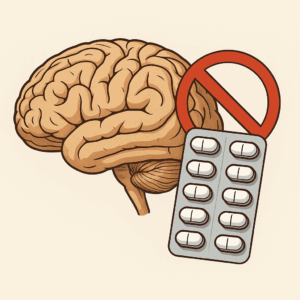Why Zolpidem Isn’t as Safe as We Once Thought: Overdose, Dependency & Long-Term Risks
 🛑 The Hidden Risks of a Popular Sleep Aid
🛑 The Hidden Risks of a Popular Sleep Aid
Zolpidem (commonly known by brand names like Ambien, Stilnoct, and Zolfresh) is widely prescribed to treat insomnia. Marketed as a safer alternative to benzodiazepines, zolpidem gained popularity in the late 1990s as a “cleaner” sleeping pill—fast-acting, effective, and non-addictive. Or so we thought.
But growing evidence now shows that zolpidem is not as safe as initially believed, especially with long-term use, high doses, or in older adults.
⚠️ What Makes Zolpidem Risky?
1. Overdose Risk — Especially in Combination with Other Sedatives
Zolpidem affects the brain’s GABA-A receptors, just like benzodiazepines and alcohol. When combined with other sedatives (e.g., alcohol, opioids, or benzodiazepines), the risk of respiratory depression, coma, or even death increases dramatically.
Common overdose symptoms:
-
Severe drowsiness
-
Confusion or delirium
-
Slowed breathing
-
Unconsciousness
-
Unintentional injury or falls
💡 Accidental overdoses are especially common when patients take more than one CNS depressant—often unknowingly.
2. Zolpidem Tolerance and Dependence
Despite its “non-benzodiazepine” classification, zolpidem can cause physical and psychological dependence.
Warning signs of dependence:
-
Needing to take it every night to sleep
-
Increasing the dose without medical advice
-
Anxiety or insomnia when skipping a dose
-
Using it to manage daytime stress
Long-term users often can’t sleep without it—and may develop rebound insomnia when they try to stop.
3. Sleepwalking, Amnesia, and Dangerous Behaviors
Zolpidem has been linked to complex sleep-related behaviors that may occur with no memory afterward.
These include:
-
Sleepwalking
-
Night eating
-
Sleep driving
-
Phone calls or online purchases during sleep
-
Falls or injuries
These risks are higher in:
-
Women
-
Older adults
-
People taking higher doses
So much so that the FDA reduced the recommended dose for women in 2013, after observing greater morning sedation and risk of accidents.
4. Cognitive Impairment and Falls in Older Adults
Zolpidem can:
-
Slow reaction time
-
Impair short-term memory
-
Cause next-day drowsiness
In older adults, this increases the risk of:
-
Falls and fractures
-
Delirium
-
Hospitalization
Many international guidelines now advise against using zolpidem in people over 65, citing more harm than benefit.
5. Long-Term Use Alters Natural Sleep Architecture
Zolpidem changes how you sleep—not just when you sleep.
Long-term use:
-
Reduces deep sleep (slow-wave sleep)
-
Suppresses REM sleep
-
Leaves users feeling less refreshed, even if sleep duration appears normal
As a result, patients often complain of:
-
Fatigue despite 7–8 hours in bed
-
Brain fog or memory issues
-
Increasing need for the drug
6. Withdrawal Symptoms Can Be Severe
Stopping zolpidem suddenly can lead to:
-
Rebound insomnia
-
Nightmares or vivid dreams
-
Irritability and anxiety
-
Shakiness or sweating
In rare cases (especially after high-dose use), withdrawal may include:
-
Panic attacks
-
Tremors
-
Seizures
This is why gradual tapering under medical supervision is essential.
🧠 Is Zolpidem Still Useful?
Yes—but only short-term and in carefully selected patients.
Ideal use:
-
Short-term insomnia (2–4 weeks max)
-
Low doses (5 mg or less for most adults)
-
Under supervision, and not mixed with other sedatives
It should not be used as:
-
A nightly crutch
-
A long-term sleep solution
-
A treatment for anxiety or chronic stress
✅ What Are Safer Alternatives?
For long-term insomnia, evidence supports:
🔹 CBT-I (Cognitive Behavioural Therapy for Insomnia)
-
First-line treatment
-
Long-term results
-
No side effects
🔹 Melatonin (short-term, low-dose)
-
Especially useful for delayed sleep phase or shift work
🔹 Sleep hygiene + relaxation
-
Regular sleep schedule
-
Wind-down routine
-
Limiting screen time, caffeine, and alcohol
🔒 Takeaway: Zolpidem Is Not as Safe as It Was Once Believed
While zolpidem may help in the short term, the long-term risks outweigh the benefits for many people—especially if used without supervision.
Overdose risk, dependence, cognitive impairment, and risky behaviors make this drug more dangerous than previously assumed.
👨⚕️ Worried About Your Zolpidem Use?
Dr. Srinivas Rajkumar T, MD (AIIMS, New Delhi), DNB, MBA (BITS Pilani)
Consultant Psychiatrist – Chennai
Dr. Srinivas specializes in:
-
Insomnia treatment without long-term medications
-
Zolpidem and benzodiazepine tapering
-
CBT-I and non-drug sleep interventions
📍 Clinics:
-
Apollo Clinic, Velachery (Opp. Phoenix Marketcity)
-
Kumar’s Healthcare, Chromepet (Near Tambaram, Pallavaram)
📞 Appointments: 8595155808
“Good sleep is possible—without lifelong dependence on pills. Let’s find a better way.”